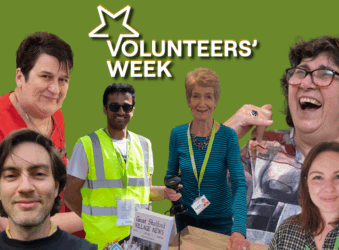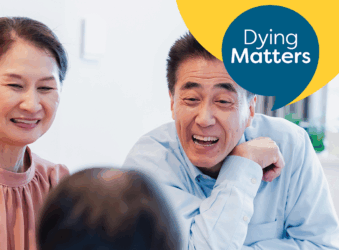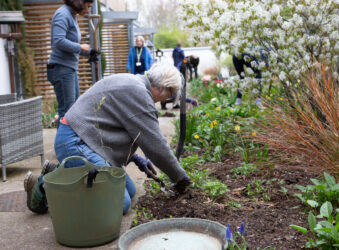An Unexpected Chapter – Day Therapy
Share this article
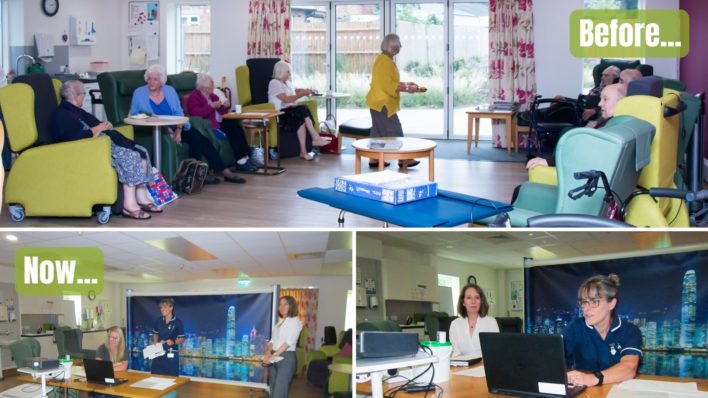
Anyone who has visited our Hospice knows that no two days are the same. This was taken to a new level earlier this year when it was necessary to put COVID-19 precautions rapidly in place.
We took some important time to reflect on these changes and ‘An Unexpected Chapter’ in our Hospice’s history.
An Unexpected Chapter for Day Therapy. Part 1 – Keeping our services running
Day Therapy is offered to patients who are living with a life-limiting condition and require specialist advice and support.
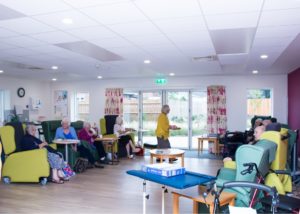
Programmes typically involve once a week contact for eight weeks, with patients engaging with our expert team.
Sessions are provided on common issues like anxiety, fatigue and breathlessness and attendees are encouraged to try exercise sessions, complementary therapy and creative activities. Time is also taken to listen and to support patients, with a focus on enabling patients to live as well as possible.
The service offers slightly different packages of support offered on different days, with the team conducting holistic assessments to help them work out which session suits someone best.
By discovering what is important to each individual, goals are shaped together so patients can work on achieving something that makes a real difference to their everyday life.
We spoke to Team Lead Sue Rossiter about what we have done to keep Day Therapy services running since COVID-19 changed everything.
How things used to be…
Before the Coronavirus pandemic, most sessions took place at the Hospice in the Evelyn Day Therapy Centre. Patients would pick and choose which activities they wished to take part in during their session and often have lunch together before or afterwards in the Bistro.
However, when the Coronavirus pandemic hit in March 2020, we had to make the difficult decision to temporarily halt face to face services. Driven by the wish to continue providing vital support to their patients, we rapidly evolved the service.
Initially, telephone and video calls were made from clinicians and by the new Caring Communities volunteers, and by April 2020 we were trialling a pilot scheme for Virtual Day Therapy.
How we’ve adapted…
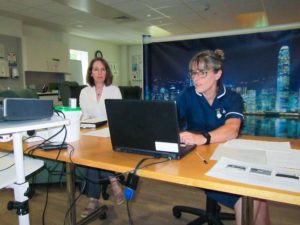
Virtual Day Therapy is now delivered via Zoom
We now have a morning timetable on a Tuesday, Thursday and Friday which includes different sessions. These include exercise therapy, breathlessness management, advanced care planning, relaxation, symptom management and Blether which is a chaplain run session exploring a specific ‘big question’ selected by the group.
Typically, we see up to 12 patients on the Tuesday, Thursday and Friday sessions and around twenty at the Social Group on Wednesdays.
Sessions are now condensed into just the morning, as we quickly realised that a full-day of Zoom was too much for patients.
Patients still benefit from an element of choice, picking which sessions they want to take part in and there are always alternatives to choose from. We manage this through the breakout room feature on Zoom, with each room hosted by a colleague and patients then being ‘brought back into the room’ after the 45-minute session has ended.
Patients still work towards the goals that were identified together in their initial assessments and are encouraged to attend the most relevant sessions to help them achieve these.
Socialising
Every other Wednesday we host a virtual social gathering which takes place for 1.5 hours and is run by two health care assistants and a volunteer.
We have found that this provides an important space for patients to talk to each other about what is happening in their lives and to enjoy some time together in a supportive and fun environment.
Private conversations and consultations
On Tuesday, Thursday and Friday afternoons, we offer individual consultations and conversations via AccuRx (a video conferencing application approved by the NHS) or via telephone, if someone does not have access to the technology required.
This is a confidential discussion where specific issues are discussed with the patient. This may include advice regarding the management of symptoms such as pain or breathlessness or discussions around advanced care planning which might include thoughts about resuscitation or a person’s priorities for their future care.
Loaning equipment
Where a patient does not have the equipment or technology needed to take part in Day Therapy sessions, we have loaned them iPads for the duration of the eight-week programme. Doing everything we can to ensuring that the service is equally available to all our patients, has been as important as ever to us during throughout the pandemic.
COVID risk assessment and pathways
There are some elements of Day Therapy that cannot be delivered virtually, for example complementary therapy, exercise on a Medimotion Bike or acupuncture.
As of September, a COVID risk assessment will be carried out and following the COVID pathway (which is a guide to remind clinicians how to see out patients in a COVID secure way) so that sessions and one-to-one appointments can take place at the Hospice. More of these sessions have now started to happen and we started seeing patient with the most complex needs, from the end of September. We hope to be able to provide more support of this type by the end of this year, to those patients who will benefit from it.
Innovation and learning…
The virtual approach has been completely new territory for many of our Day Therapy team, who – by the very nature of their roles – are practical, hands-on professionals and therapists. Before coronavirus and lock-down we were therefore unfamiliar with the online world of virtual support.
Whilst it has been our biggest challenge and greatest learning curve, embracing and understanding technology has been the real silver lining out of all of this. We have had to consider different ways of working and then implement it; even our Life Celebration work has been transformed. It was a bit like being pushed off the top of a ski-slope, scary at first but now we’re speeding along! The resistance to technology that had existed in the pre-COVID world seems to have (mostly!) disappeared.
The patient’s point of view…
We have found that there has been increased social interaction on the computer compared to how it used to be in the Day Therapy Lounge. Barriers that patients might have experienced such as positioning of chairs, need to use hoists or being hard of hearing have been removed. This has worked really well, as it means everyone gets their change to speak, be heard and make choices.
One gentlemen took a moment to tell us about his experience of virtual Day Therapy and the difference it made to him:
A small group of patients really struggled with engaging on virtual and video platforms: some people just don’t have the technology, don’t know how to work it, or simply didn’t want to engage in that way. An eight-week telephone programme has been offered to them.
Challenges…
We have all missed the face to face interaction: patients, colleagues and volunteers alike. There is no way of replicating the human element of putting a hand on a shoulder and squatting down next to someone to really listen to their needs. It has been so hard, not being able to offer that, and we have mourned that loss.
However, the team had just one week to immerse themselves into this new way of working, train and upskill themselves. Having to adapt was stressful and not without its difficult moments, but we are so amazingly proud that we have rapidly and competently adapted to delivering support virtually, and with such confidence.
Opportunities and what’s next for the team…
Increasing referrals
Whilst the team is still supporting the same number of patients they were before the pandemic, we are receiving referrals less frequently. This is probably because healthcare professionals have assumed that we were/are no longer able to operate. So, we would like to spread the word that we are still offering Day Therapy and providing vital clinical and social support to patients.
Reintroducing volunteers
Our volunteers have always been critical to delivering Day Therapy and providing the friendly welcome that makes patients feel immediately at home. They have been unable to help in the same way during the pandemic, due to the restraints of our new ways of working. Now though, some are able to start getting involved virtually, which we’re really excited about.
Offering a ‘blended approach’
Depending on what happens with next COVID-19, we would hope to offer a blended approach moving forwards. We would like to combine elements of Day Therapy as it used to be and offer virtual options where this has proved positive. For example, a virtual session might enable a session for a patient which otherwise may have been impossible, due to limitations of transport or carer availability.
Providing support for Carers
We also have plans to hopefully implement a Virtual Carers Group at the end of this month, for the family and friends of those we are supporting in Day Therapy. Watch this space!
Read ‘An Unexpected Chapter – Inpatient Unit’
Read ‘An Unexpected Chapter – The Patient and Family Support Team’
Read ‘An Unexpected Chapter for our Director of Fundraising and Communications
Read ‘An Unexpected Chapter – Hospice at Home’
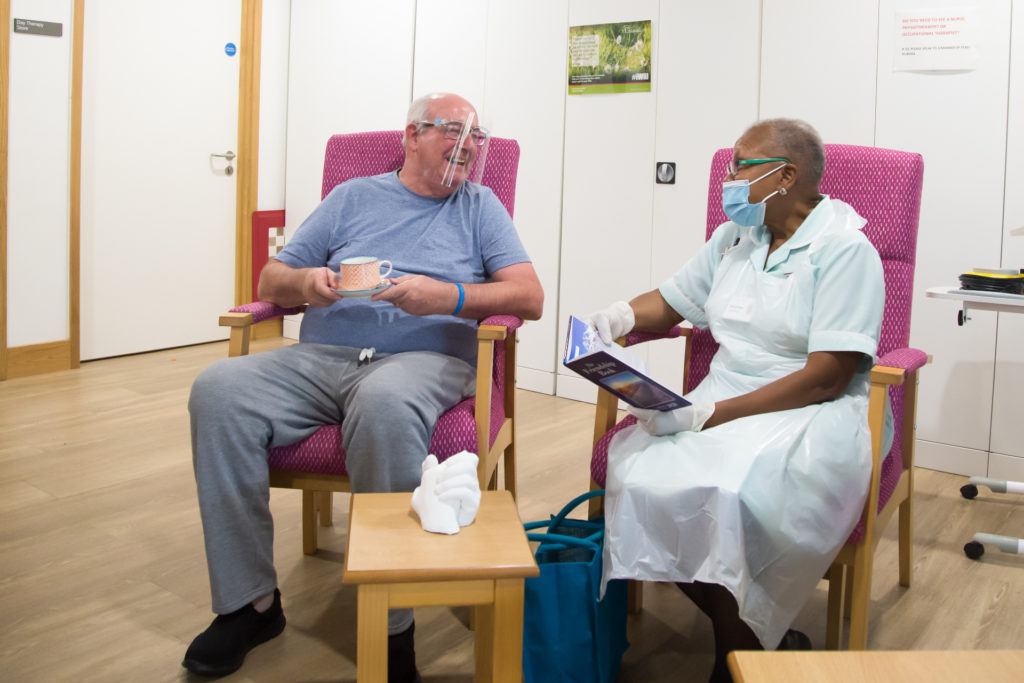
Related articles
-

Hospice Volunteers recognised during National Volunteers Week 2025
Arthur Rank Hospice Charity says thank you to over 600 volunteers
-

Hospice delighted with the results of Quality Assurance Visit
Quality assurance visit was conducted as part of the Cambridgeshire and Peterborough Integrated Care Board (CPICB)
-

The Culture of Dying Matters for patients at Arthur Rank Hospice Charity
Read how the Charity supports patients individual needs
-

Hospice Volunteer Gardeners makeover the Inpatient Unit gardens
Volunteer gardeners support Hospice patients and their loved ones

